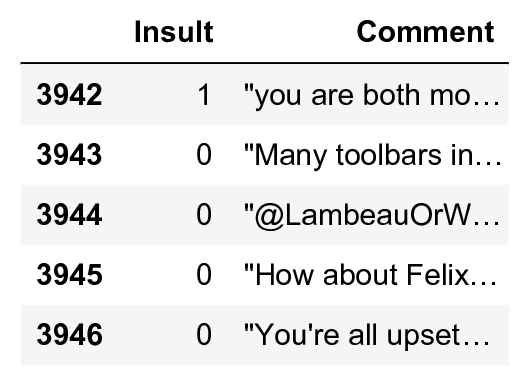Jupyter Snippet CB2nd 04_text
Jupyter Snippet CB2nd 04_text
8.4. Learning from text — Naive Bayes for Natural Language Processing
import numpy as np
import pandas as pd
import sklearn
import sklearn.model_selection as ms
import sklearn.feature_extraction.text as text
import sklearn.naive_bayes as nb
import matplotlib.pyplot as plt
%matplotlib inline
df = pd.read_csv('https://github.com/ipython-books/'
'cookbook-2nd-data/blob/master/'
'troll.csv?raw=true')
df[['Insult', 'Comment']].tail()

y = df['Insult']
tf = text.TfidfVectorizer()
X = tf.fit_transform(df['Comment'])
print(X.shape)
(3947, 16469)
p = 100 * X.nnz / float(X.shape[0] * X.shape[1])
print(f"Each sample has ~{p:.2f}% non-zero features.")
Each sample has ~0.15% non-zero features.
(X_train, X_test, y_train, y_test) = \
ms.train_test_split(X, y, test_size=.2)
bnb = ms.GridSearchCV(
nb.BernoulliNB(),
param_grid={'alpha': np.logspace(-2., 2., 50)})
bnb.fit(X_train, y_train)
bnb.score(X_test, y_test)
0.761
# We first get the words corresponding to each feature
names = np.asarray(tf.get_feature_names())
# Next, we display the 50 words with the largest
# coefficients.
print(','.join(names[np.argsort(
bnb.best_estimator_.coef_[0, :])[::-1][:50]]))
you,are,your,to,the,and,of,that,is,in,it,like,have,on,not,for,just,re,with,be,an,so,this,xa0,all,idiot,what,get,up,go,****,don,stupid,no,as,do,can,***,or,but,if,know,who,about,dumb,****,me,******,because,back
print(bnb.predict(tf.transform([
"I totally agree with you.",
"You are so stupid."
])))
[0 1]